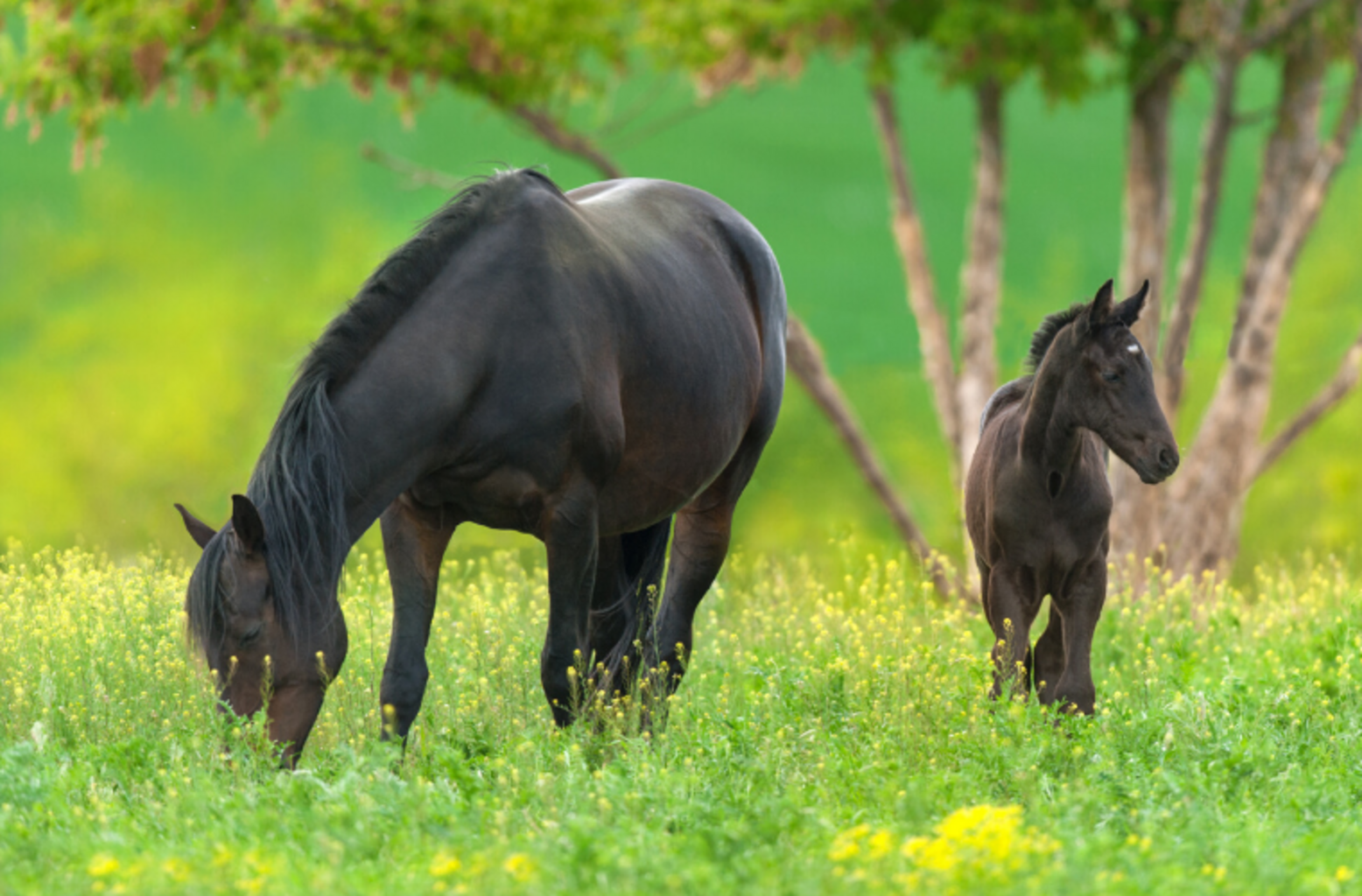Pregnancy in horses
By Amelie Kokorsky
Almost everyone, whether a horse owner or not, thinks a little foal is super cute and sweet. The big eyes and the uncertain gait with the playful curious nature make every heart beat faster. It is not without reason that many mare owners dream of raising their own foal from their mare. In this article, we would like to talk specifically about feeding the mare before, during and after pregnancy. With feeding, you can support and to some extent even control the process of the entire pregnancy. So, if you are thinking of mating your mare, you should not only deal with the issue of pedigree and management, but also look at the issue of feeding.
Feeding the mare BEFORE pregnancy
Not every mare becomes pregnant immediately at the first attempt. This problem can have many different causes. In this article we would like to go into more detail on feeding and not look further at other possible causes such as stress, incorrect horse management or organic causes, as these have to be analyzed and remedied on a very individual basis.
Some mares may have difficulties getting pregnant due to cycle disorders. The administration of chasteberry can help to bring the cycle back into balance and thus increase the chance of pregnancy.
Another deficiency that can lead to cycle disorders and/ or an irregular cycle is a deficiency of iodine. The administration of iodine or iodine-containing feed can bring the cycle back into balance. However, caution is advised here, because an over-supply of iodine can lead to goiter formation and/ or malformation of the limbs in the foals. It is therefore best to always consult a veterinarian when giving iodine.
Selenium levels should also be determined during pregnancy, as a selenium deficiency can be detrimental to the development of the embryo. Selenium deficiency can also decrease the vitality of the newborn foal. The fertility of the mare can also be optimized with the administration of provitamin B-carotene and vitamin A. The mare's ovaries should also be well supplied, of course. Since the work of the ovaries depends on essential amino acids, the ovaries can be supported with the administration of lysine and methionine and a deficiency can be prevented. If the mare does not become steedy, an increased dose of methionine can help to get her in heat again. Many problems and disorders can already be positively supported BEFORE pregnancy with optimized feeding. The influence of the basic feed, i.e. hay and straw, should not be underestimated, because poor hay and/ or straw quality can also have a negative effect on fertility and in bad cases even lead to an abortion of pregnancy. Good basic feed is therefore just as important as any supplementary feed.
Feeding DURING pregnancy
The time has come. The vet confirms the pregnancy. The joy is great, but the concern for and the care of the mare's health also grows. The average gestation period for horses is about 320-360 days. The 1st-7th month of pregnancy is called the "down-bearing period" and the 8th-11th month of pregnancy is called the "up-bearing period".
In the first 7 months of pregnancy, the mare should always be able to cover her daily basal metabolic rate. This depends on the load of the mare, because even a pregnant mare can and should be moved. The basic requirement should be covered by high-quality hay. In addition, a good mineral feed should not be missing. To counteract abortion and to protect the life of the embryo, the supplementary feeding of B-carotene can be useful. B-carotene can have a positive effect on the production of progesterone. Progesterone is also known as the "pregnancy hormone" and can promote the survival of the embryo in the mare's womb. Feeding in the first 7 months of pregnancy is still quite straightforward and simple.
From the 8th month of pregnancy, feed management slowly becomes more demanding. The energy requirement increases with each month of pregnancy. The mare will also eat more, but sometimes she cannot meet her increasing needs despite increased feed intake. Important in the last months of pregnancy are:
- Calcium and Phosphorus; for fetal bone growth (especially in the last 3 months of pregnancy). The skeletal growth and development of the foetus depend on these minerals.
- Zinc, selenium, copper; the embryonic development of tendons, ligaments and cartilage are dependent on these trace elements.
- Vitamin D and K; are also important for skeletal growth.
- Vitamin D and A; are important for the immune system. If there is a deficiency here, the newborn foals often show a susceptibility to infections and are weak and tired.
To ensure that at the time of birth the first milk, the so-called colostrum, already contains all important fat-soluble vitamins and that the foal is supplied with these important vitamins directly from the first suckling, it is recommended to supply the mare with vitamins E, D, K and A BEFORE birth. The vitamins get directly into the mare's milk and can be absorbed by the newborn foal. The absorbed vitamins take over an important protective function in the body of the newborn foal within a few hours.
One should always keep in mind that the quality and quantity of the mare's milk can be controlled to a large extent through feeding.
To ensure that the mare's milk provides the newborn with enough energy and protein for its start in life, the mare should be fed a high-protein and high-energy diet in the last month of pregnancy. Stiefel Linseed Oil is particularly suitable as a supplementary feed during this time, as it contains important fatty acids. Hemp oil, which is still quite unknown in horse feeding, is also a good feed supplement. It has a very good fatty acid profile and can also support the mare's immune system. If the mare is not able to cover her energy needs completely, you can also feed her grain such as barley or oats. Some mares are also happy to receive a portion of mash. It should be noted that it is better to feed 2-3 smaller portions throughout the day than to give a large portion at once.
Always remember: Breast milk is the life source for the newborn foal!
|
600 kg / KM |
Calcium | Phosphorus | Sodium | Potassium | Chlorine |
|
Day 275 |
37 | 26 | 24 | 26 | 29 |
|
Day 320 |
59 | 40 | 25 | 26 | 30 |
|
Day 335 |
72 | 48 | 25 | 27 | 30 |
The increase in calcium and phosphorus is most clearly. At the end of gestation, the requirement almost doubles. This is because these two minerals are essential for foetal skeletal growth. A deficiency can lead to malformations or very small foals. Other bulk elements such as potassium and sodium increase only minimally during pregnancy. All the more important is the additional need for essential amino acids. These include lysine, methionine and threonine. Just like before the actual pregnancy, a supplementary feeding of these amino acids can make sense.
Should I move my mare during pregnancy?
The answer to this question is a quick and simple -YES-. The mare is not sick, the mare is pregnant. A pregnant mare should also be exercised regularly. In the last months of pregnancy, the intensity of exercise should be reduced. If you keep a close eye on your horse, you will quickly notice what exercise is good and what is too much. However, walks, ground work and light work on the lunge line or under a rider are allowed and even desirable. The mare's digestion must be kept in motion in any case and light exercise is beneficial for digestion. The occurrence of colic as well as other complications of the digestive system can be reduced with light, regular exercise.
Feeding AFTER birth
The time has come: The little foal has been born. Quite instinctively, the mare gets up immediately after birth and takes care of the foal. If the foal is healthy, it should get up within a few minutes (20-90 minutes) and go to the mare's udder all by itself to take in its first milk. After about 12 hours, the foal will take milk all by itself and without complications. Often, it is only now that the foal and the mare are at peace. Both need this rest and should not be constantly disturbed - even if the temptation is of course enormously high. Mare and foal will normally get used to each other very quickly and build up a strong bond.
Even if the sight of the cute foal enchants you, you should never forget the health of the mare, because her health also decisively determines the health of the foal. The production of milk is a small, daily high performance work for the mare in which the owners can support her well. Milk production is still relatively low in the first days after birth, but increases quickly. Depending on the mare's condition and expression, the amount of concentrated feed can now be slowly increased and individually adjusted. Too much" is just as unhealthy as "too little", so the amount of concentrate and all other feed supplements should be increased slowly and under good supervision.
The basic feed should never be deficient! The mare should always have access to sufficient hay of good quality. A basic feed "ad libitum", i.e. a requirement of hay as much as the mare wants to eat, should be aimed for.
Even after birth, supplying the mare with calcium and phosphorus is very important. But also vitamins A, E and D should not be missing from the mare's diet, as in the last months of pregnancy.
After birth, the zinc supply also comes into play, because the zinc requirement increases. Even if the mare is standing on the pasture with the foal, a zinc deficiency can occur. Zinc is important for hair and hoof formation, but also an important building block in the immune system of mare and foal. A deficiency should therefore be prevented. If you observe a weak vitality in the foal, possibly in connection with a susceptibility to infections, a selenium deficiency may also be present. It is not uncommon for these symptoms to occur in both mare and foal. Selenium supplementation can help, but should be discussed with a veterinarian or animal health practitioner beforehand.
"The intestine - the mirror of health"
Okay, but what does this sentence have to do with the mare's pregnancy or even with the foal?! A lot!
The intestine, or rather the large intestine, reflects a very large part of the health of our horses in most cases. If the intestine is sick, the horse is sick. If the intestine cannot work at 100 %, many important nutrients are lost and this deficiency can actually lead to infertility. You can put as many great supplementary feeds into the mare: If the intestine is not able to absorb these nutrients, the deficiency cannot be corrected.
We have already explained how important certain nutrients are for fertility and also for pregnancy. It is now important to understand that the intestine plays a major role in this issue. A sick (large) intestine cannot only lead to infertility and problems during pregnancy, but also can have a big impact on the health of the foal.
If you watch foals, you sometimes see foals eating their mother's faeces. This may seem daunting and wrong at first, but it's actually totally brilliant. The foal is born and has a completely sterile intestine without bacteria. Sounds good at first, but it's not, because without bacteria, digestion doesn't work. Horses, like humans, have and need thousands of bacteria in their intestine. So the foal is instinctively clever enough to eat its mother's faeces so that bacteria can settle in its intestine. These are not just any bacteria, but those that the mare also needs for her digestion. The settlement of bacteria in the intestine depends very much on the food supply. If the mare is standing in a dry meadow with lots of herbs and grasses, she will have different bacteria in her intestine than a mare standing in a thickly overgrown meadow with lots of wet and tall grass. So when the foal eats faeces, it also gets the bacteria for the intestine that fit its current environment and the food supply. In this case, eating faeces is not "IHHH", but "AHHH excellent". After 4- 6 months, the foals have built up their own intestinal environment and then also stop eating their mother's faeces.
It quickly becomes clear why the mare's intestine should be intact. If the intestine is not optimally populated with bacteria, it will not be able to work optimally and the important faeces for the foals will not be provided with the right bacteria. The vicious circle of intestinal diseases can therefore start at a very young age, namely through the lack of bacteria from the mare's faeces, which is enormously important for the development of the foal's intestines.
Intestinal health is therefore a very important part for breeding and for the desire of a foal. Only a mare that has a healthy intestine can enable her foal to build up a healthy intestine flora.
What is the best way to feed my mare before, during and after pregnancy?
To return to the previous topic, we will first look at the intestine in feeding, because it should be in the best of health at all times. Here is an overview of products that can support intestinal health:
- Aniseed
- Fennel seeds
- Black cumin oil
- Liquorice root
- Stiefel Intestinal Herbs
- Stiefel Biochar
Otherwise you can support the mare BEFORE pregnancy with the following products:
Stiefel Chasteberry can have a positive effect on the horse's hormonal balance. The cycle can be stabilized and regulated. The fertility of the horse can also be positively influenced.
This iodine-containing supplementary feed can have a regulating effect on the mare's cycle and additionally strengthen the immune system.
Stiefel Amino Plus can compensate for a lack of lysine and methionine and thus increase fertility. It also contains vitamin A, which can also have a positive effect on fertility.
The following products are suitable for feeding the mare DURING pregnancy:
Can be fed throughout pregnancy to prevent lysine and methionine deficiencies. The need for both amino acids increases especially in the last months of pregnancy.
This mineral feed can counteract mineral deficiencies and should be fed throughout pregnancy. If fed daily, Stiefel Organic-Mineral can supply the horse with all vital substances in very high quality.
Especially in the last months of pregnancy, the need for calcium should be covered to ensure a good development of the foal's skeleton.
Stiefel Zinc Plus contains not only zinc, but also selenium and copper. It is therefore very suitable to prevent or compensate for a possible deficiency during pregnancy. Especially the tendons and ligaments of the foal can benefit from the administration of Stiefel Zinc Plus.
Stiefel Vitamin Liquid is a liquid combination of valuable vitamins, trace elements and amino acids and can compensate for feed-related deficiencies of these substances. Stiefel Vitamin Liquid thus represents a useful and high-quality enhancement of the daily basic feed ration of pregnant mares.
Both oils provide the mare with additional energy and have a good fatty acid profile of the vital omega fatty acids.
The following products are suitable for feeding AFTER pregnancy and during lactation:
Stiefel Amino Plus is also very suitable after the birth of the foal to compensate for possible deficiencies in lysine and methionine.
Even after birth, the need for calcium is increased, so that the administration of calcium can counteract possible deficiency symptoms.
Even after birth, the foal needs to be supplied with important vitamins. As it absorbs all nutrients through the mare's milk, the mare should be provided with sufficient vitamins. Stiefel Vitamin Liquid can help with an optimal supply of vitamins for mare and foal.
The mare's zinc requirement increases after the foal is born. Rarely can this additional requirement be covered by the basic feed. As zinc takes on many important tasks in the development of the foal, the deficiency should be compensated for as quickly as possible or, in the best case, not occur at all. By feeding zinc, this deficiency can be remedied or treated preventively.
Not every mare needs all the products listed. Each mare should be dealt with individually and a suitable feeding plan tailored to the respective mare should be created. With the appropriately selected products, there is hardly anything standing in the way of the desire for a foal. However, if there are any uncertainties in choosing the right products, you should always consult a veterinarian or animal health practitioner. There is always a suitable product for most problems. ☺

Are there also "prohibitions" in feeding that should be noted with a pregnant mare?
Most herbs have a positive effect at first, but there are a few exceptions among the herbs that should be kept in mind during pregnancy. Of course, the same always applies to any additional herb you feed - avoid overdosing! Therefore, always follow the instructions on the products. Should you (want to) deviate from this, please always discuss this with a vet or animal healthpractitioner beforehand.
For pregnant mares, there are other things to think about in addition. Basil leaves and oregano should never be overdosed, especially towards the end of pregnancy. The herbs can have a labour-inducing effect in higher quantities. Premature birth of the foal must be prevented in any case.
Basil is not contained in any of our Stiefel products, oregano can be found in the Stiefel Intestinal Herbs. However, as oregano is only found in small amounts, overdosing should not be possible if you follow the feeding instructions. However, please be sure to consult a veterinarian before feeding.
Sage should not be fed in the last weeks of pregnancy because of its possible labour-inducing effect.
Thyme should also not be given to pregnant mares.
Feeding garlic can change the taste of the mare's milk, so that some foals may react to this taste by refusing milk. So the same applies here: Dose carefully or stop feeding it altogether in the last days of pregnancy and during lactation.
In most cases, however, feeding herbs is harmless if you stick to the dosage given. If negative symptoms such as fecal water, colic symptoms or changed behaviour related to pregnancy such as a bulging udder (milk production) or signs of labour appear, the veterinarian should be contacted immediately. Rapid feed changes should be avoided during pregnancy and lactation. Supplementary feeds should always be fed slowly or "snuck in". Possible side effects can be recognized much more quickly in this form and it is easier to take countermeasures.
Here is an overview of the most important principles:
- Before mating, the mare should be in good nutritional condition. She should be neither too thin nor too fat, as both can lead to complications.
- During mating the mare should always have a positive energy balance. A negative energy balance can lead to a miscarriage.
- A sufficient supply of vitamins, especially vitamin E, D, K, A should be ensured.
- The increasing need for zinc, lysine and methionine should be balanced.
- All feeds, especially the basic feed hay, should be available in best quality and sufficient quantity.
- The mare may and should also be exercised during pregnancy. Exercise should always be adapted to the health and status of the pregnancy. The closer the birth, the less intense the exercise should be.
- Don't forget the intestine!!! ☺
If you keep these points in mind, you are already well positioned in terms of feeding the mare before, during and after pregnancy. Nevertheless, approach the subject of breeding and especially the subject of feeding during breeding and pregnancy very carefully. Many mistakes can be avoided if feeding is optimal and above all adapted to the needs. However, incorrect feeding can also lead to mistakes and complications. Each mare is very individual and should be treated individually, especially when it comes to pregnancy. If you are unsure and/ or have any questions, please consult a veterinarian or animal health practitioner you trust.
We keep our fingers crossed for your breeding success and wish you lots of fun and health for the mare and the desired foal.
Latest reviews
-
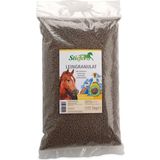 5.0 (7)
5.0 (7)Stiefel Linseed Granules, 5 kg
- Ready-to-feed linseed cake
- High mucilage content
- Reduced fat content due to cold pressing
£17.80 (£3.56 / kg)Delivery by January 09
-
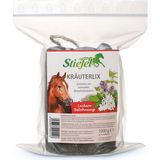 4.8 (10)
4.8 (10)Stiefel Kräuterlix Horse Lick, 1 kg
- Lick stone with bronchial herbs
- A tasty reward
- With attached cord to tie it up
£13.33 (£13.33 / kg)Delivery by January 20
-
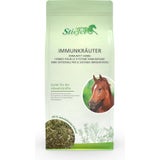 5.0 (7)
5.0 (7)Stiefel Immunity Herbs , 1 kg
New!- 100% natural herbal mixture
- Immunity herbs
- Good for the body's defences
£22.27 (£22.27 / kg)Delivery by January 09
-
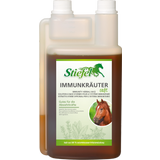 4.8 (6)
4.8 (6)Stiefel Immunity Herbal Liquid, 1 l
Bestseller- To support the immune system
- Made of 100% natural herbs
- No added sugar
£15.12 (£15.12 / l)Delivery by January 09
-
Great Britain: Free standard delivery from £79.90
-
Free
returns Secure payments
with SSL encryption technology

